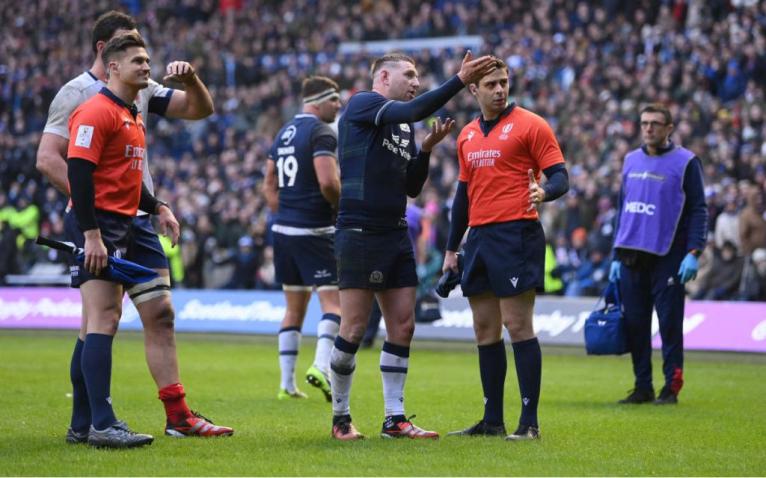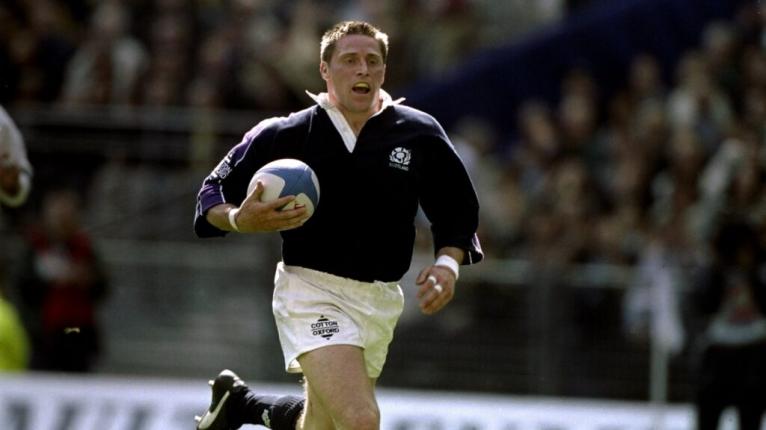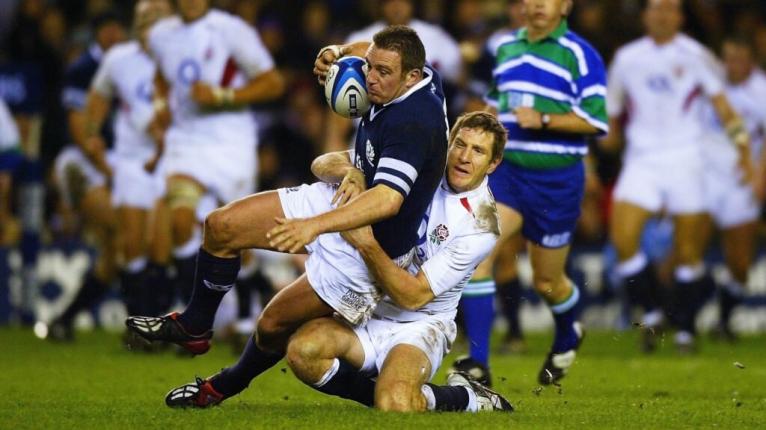First Scotland scored a trademark try. A rookie full-back linking with a scrum-half on the support line. A mighty Murrayfield roar. #ScottishRugby. Then they set up camp in France’s 22. They couldn’t stick on a second try, but they kept hammering the line. Even as half-time approached and they had the option to kick an easy three points, they kept hammering the line. Pragmatists raged but you had to admire the gumption.
Scotland are a limited side. Their engine lacks torque and they’re short of heft in the tight exchanges. But their backline ticks every box. Punch in midfield. Pace and power on the wing. A conductor who is taken seriously when he jokes he’s rugby’s answer to Lionel Messi.
Then they froze. In the second half, with a six-point lead, they bumbled their way through an inauthentic defensive plan. It was as if they’d taken notes watching a YouTube video titled, ‘How Big Teams Hold Leads’ and played a poor cover version in the wrong key.

France – not that France; a clunkier, skittish version – scored a dazzling try of their own and notched a penalty to edge in front. With four minutes left, Scotland had to revert to type to save face. Kyle Rowe’s solo dancing run sent a pulse into their listless show and when they nicked the ball at the death they could almost touch the French line.
A pick and go to start. That made sense. Set the board. Another pick and go. Place the pieces. Then another pick and go. What were they doing? Another one. Couldn’t they see how this would end?
Whether or not Sam Skinner wrestled the ball to the turf is almost immaterial. When offered the opportunity to prove themselves, Scotland failed to show up. Forget missing the target. They never even took aim.
It seemed as if something had happened to Scotland. That muscle memory gave way to clouded thoughts. That the fear of trying but failing had enveloped them. That they didn’t really believe they could do it their way.
“It has to do with mental toughness,” opines Alan Tait, who played 27 Tests for Scotland and two for the 1997 British and Irish Lions either side of a nine-year stint in rugby league. “I couldn’t believe what I was seeing in those closing minutes. This is probably Scotland’s best ever backline but they shrunk in on themselves. I couldn’t figure it out. It baffles me why they can’t get over the line in those big games. The only conclusion I can draw is they don’t fully trust that they can do it.”
The Scottish players’ wells weren’t as deep as the boys back in New Zealand or over in South Africa.
Tait is quick to mention some famous Scottish wins. In 2020 they broke an 18-year duck in Wales. In 2021 they battled to a first win at Twickenham for 38 years and head into Saturday’s Calcutta Cup match on a three-game winning streak against England. That same year they beat France in Paris for the first time since Tait himself dismantled Les Bleus in 1999, a result which would clinch what remains Scotland’s last title.
All these victories point to an exorcising of past demons. That this team could be both progressive and an echo from the glory days. Here was a sign of progress. At least it would be were it not for the caveats.
In addition to the wins in France and England in 2021, home defeats by Ireland and Wales meant Scotland finished fourth in that year’s championship. This year against Wales, a blistering first-half performance was almost torpedoed by staggering incompetence in the second. From 27-0 in front, they were lucky to escape Cardiff with a one-point win. Their tame World Cup exit last year raised doubts about their ability to climb the next rung. Those doubts remain.
Speaking to the Scotsman newspaper in 2018, Jason O’Halloran, the former All Black centre who later worked as an assistant coach with Scotland, questioned the mental fortitude of the Scots.
“From my point of view, as a Kiwi having come over here two years ago now, that’s the biggest area for growth in Scottish rugby, the whole sports psych thing. I don’t think it’s done particularly well at all,” O’Halloran said. “It’s often just seen as a bit of voodoo and witch-doctor stuff, which is where we were at in New Zealand probably 20 years ago. It’s a crucial part of the game and I think it’s something [Scotland] could do a lot better.”

O’Halloran also felt Scottish players were less coachable than their New Zealand counterparts and they struggled with critical feedback. He did not mention raw talent. In fact, he believed Scotland had the materials to be among the “top three of world rugby”. All that was missing was a bit of self-confidence and psychological resolve.
Another Kiwi shares this view. Brendan “The Chainsaw” Laney was a hard-running utility back for the Highlanders in Otago when he moved to Edinburgh in 2001. He’d been in the country for less than a week before Scotland’s coach, Ian McGeechan, made the shock announcement Laney would make his Test debut for his adopted nation against the one he’d just left. And though his time in Scotland was limited to five years, he saw enough to weigh in on the subject.
“I think the main difference I saw, mentally, between Scotland and New Zealand, was that ruthlessness,” Laney says. “In New Zealand, rugby is everything. And winning was the most important thing in the world. There was no excuse not to win. I never felt that same deep desire in Scotland.
“Of course at the top, whether at Edinburgh [where he won 76 caps] or with Scotland [where he registered 141 points from 20 games] every player involved wanted to win. But I’m not sure they felt that in their bones.
“I remember before one training session, one of the coaches brought out a football. That was the most excited I saw the group. I was shocked. Clearly football was still king, even in a rugby environment. These were brilliant players. Proud players. But their wells weren’t as deep as the boys back in New Zealand or over in South Africa.”
If they’d tried a skip pass or a run wide but knocked on, that would have least shown some balls.
Springboks and All Blacks players, who collectively have won 70% of all World Cups, are exposed to high-pressure moments at a much earlier age than most of their competitors. The intensity of school boy rugby in South Africa and New Zealand is unmatched. Here, teenagers are asked to score match-winning tries or slot 80th-minute kicks at goal in front of tens of thousands of people while carrying the weight of a hundred years of tradition on their young shoulders.
“Unless you’ve been there, you can’t know what it’s like,” says Laney, who played first XV rugby at Timaru Boys High School in South Canterbury. “Games against Waitaki Boys, for example, felt like a Test match. So when I made the step up to professional and then international rugby it felt like I’d already been there. I wasn’t daunted. I think having those lessons at a young age hardens players from New Zealand and South Africa. Scottish lads just don’t have anything like that to help them mentally prepare for the big moments.”
There isn’t one answer to this sweeping conundrum. Multiple trends and forces are at play at once, all culminating in a golden Scottish generation facing the possibility of not living up to its potential. Another variable at play here might be something that impacts all of Scottish society, even those not concerned with the fate of an oval ball.
“It’s true the Scottish public can be quite pessimistic,” says Craig Chalmers who was Scotland’s fly-half the last time the team won the Grand Slam, back in 1990 before Italy joined the competition. “I personally don’t like it. I think it speaks to a small mindedness and insecurity in Scotland. But it does exist. I’ve encountered it.
“Does that mean Scotland lost to France because they were pessimistic? God, I’d hope not. I can’t imagine they don’t have confidence in themselves as rugby players. You can’t tell me Finn Russell or Duhan van der Merwe are not confident. But we didn’t see it. I really don’t know. Maybe they need to show a bit more arrogance out there. People called me arrogant when I played. I just saw it as confidence.”

Chalmers recounts the closing minutes against England in the final match of the 1990 championship. Scotland led 13-7 as a resounding team talk, delivered by the double act of McGeechan and Jim Telfer, rang in the ears. They were up against a formidable English pack. On paper, the more lightweight Scots should have been blown away.
“It was belief that got us through,” Chalmers explains. “That’s all it takes sometimes. Just to get over the line. To drag yourself over the line. Sometimes you have to trick yourself into believing. Even when you don’t really believe, you have to tell yourself you do.
“Our coaches were brilliant in that regard. I don’t know what this current coaching group is saying but I hope they’re telling the team they can beat anyone. I also hope they’re encouraging them to have a go, to back themselves.
“That’s what makes this group special. Not that rubbish they showed, just kicking it aimlessly and not having a clue. I think the Scottish public would have been forgiving if they gave it a go and lost. If they’d tried a skip pass or a run wide but knocked on, that would have least shown some balls.”
Coaches will dismiss the concept out of hand and players will scoff at historical hangovers, but it does seem certain teams are tethered to institutional narratives. When a side wins three consecutive games to claim a World Cup, why does it make sense it’s the Springboks? Why do Ireland continue to falter at the quarter-final stage? And how can England produce utter dross and still come within a scrum of making a final? The players change. The opposition is different every time. But the story ends the same way. Perhaps there’s more to the notion of legacy than a simple narrative device.
“I think there’s some truth to that,” Laney says after some thought. “You can inherit a winning mentality but you can also be forced to carry the pain of previous generations’ failures,” adds Tait. “For Scotland to get over this mental hurdle, they’ll have to start winning tough games against big opposition,” Chalmers contributes. “If they don’t, this wonderful team could land up winning nothing. That would be a terrible shame.”



Comments
Join free and tell us what you really think!
Sign up for free